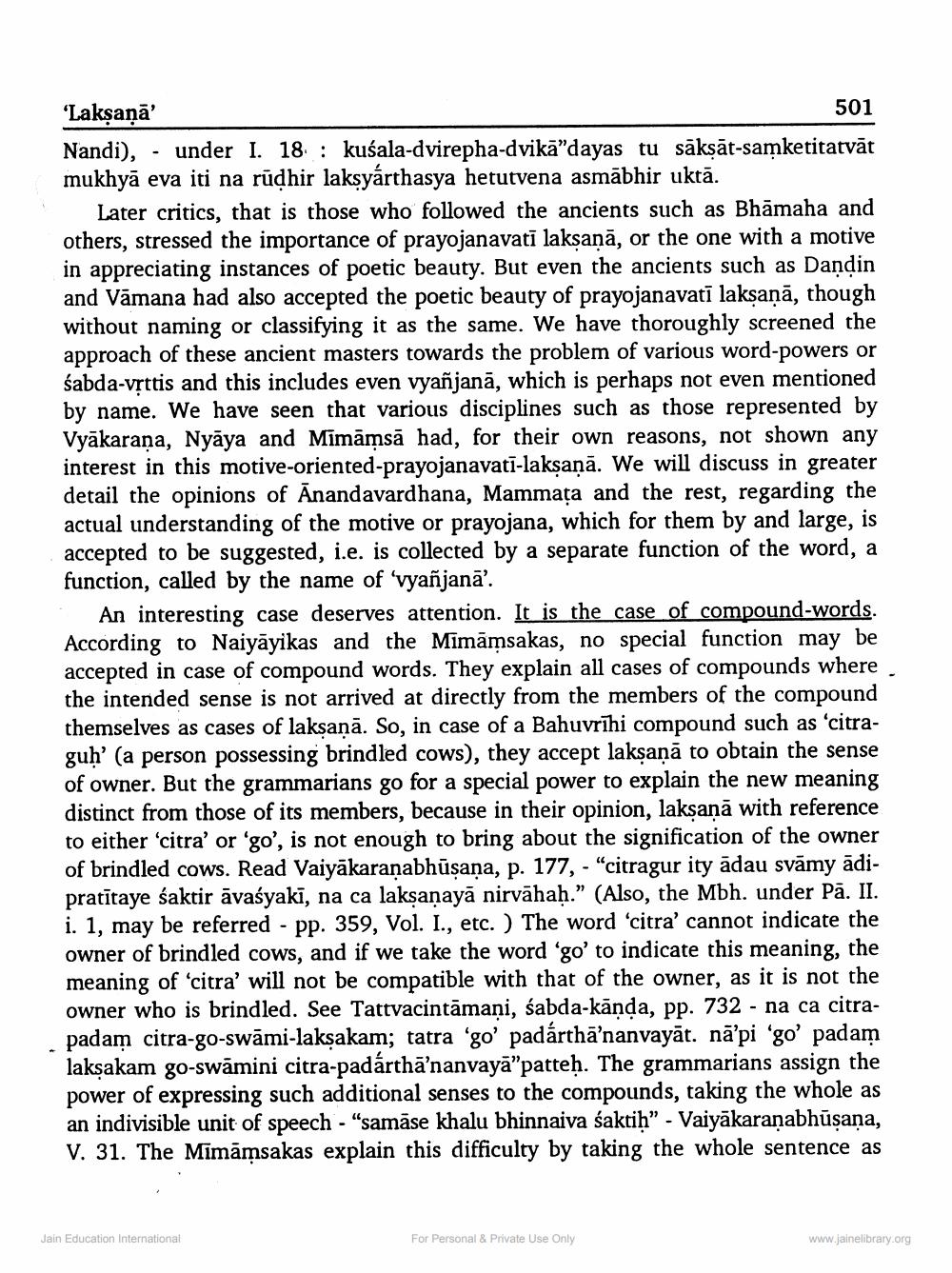________________
‘Laksanā
501
Nandi), - under I. 18 : kusala-dvirepha-dvikā"dayas tu saksāt-samketitarvāt mukhyā eva iti na rūdhir laksyárthasya hetutvena asmābhir uktā.
Later critics, that is those who followed the ancients such as Bhāmaha and others, stressed the importance of prayojanavati laksanā, or the one with a motive in appreciating instances of poetic beauty. But even the ancients such as Dandin and Vāmana had also accepted the poetic beauty of prayojanavati laksanā, though without naming or classifying it as the same. We have thoroughly screened the approach of these ancient masters towards the problem of various word-powers or śabda-vrttis and this includes even vyañjanā, which is perhaps not even mentioned by name. We have seen that various disciplines such as those represented by Vyakarana, Nyāya and Mimāmsā had, for their own reasons, not shown any interest in this motive-oriented-prayojanavati-lakṣaṇā. We will discuss in greater detail the opinions of Anandavardhana, Mammața and the rest, regarding the actual understanding of the motive or prayojana, which for them by and large, is accepted to be suggested, i.e. is collected by a separate function of the word, a function, called by the name of 'vyañjanā”.
An interesting case deserves attention. It is the case of compound-words. According to Naiyāyikas and the Mimāmsakas, no special function may be accepted in case of compound words. They explain all cases of compounds where the intended sense is not arrived at directly from the members of the compound themselves as cases of laksanā. So, in case of a Bahuvrīhi compound such as ‘citraguh' (a person possessing brindled cows), they accept laksana to obtain the sense of owner. But the grammarians go for a special power to explain the new meaning distinct from those of its members, because in their opinion, laksana with reference to either citra' or 'go', is not enough to bring about the signification of the owner of brindled cows. Read Vaiyakaranabhūsana, p. 177, - "citragur ity adau svāmy ädipratītaye saktir āvaśyakī, na ca laksanayā nirvāhah.” (Also, the Mbh. under Pā. II. i. 1, may be referred - pp. 359, Vol. I., etc.) The word 'citra' cannot indicate the owner of brindled cows, and if we take the word 'go' to indicate this meaning, the meaning of 'citra' will not be compatible with that of the owner, as it is not the owner who is brindled. See Tattvacintamani, sabda-kānda, pp. 732 - na ca citrapadam citra-go-swāmi-laksakam; tatra 'go' padárthā'nanvayāt. nā’pi 'go' padam laksakam go-swāmini citra-padárthā’nanvayā"patteh. The grammarians assign the power of expressing such additional senses to the compounds, taking the whole as an indivisible unit of speech - "samāse khalu bhinnaiva saktih" - Vaiyakaranabhūsana, V. 31. The Mimāmsakas explain this difficulty by taking the whole sentence as
Jain Education International
For Personal & Private Use Only
www.jainelibrary.org




